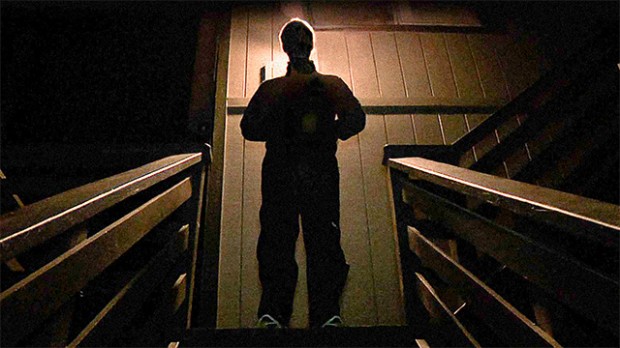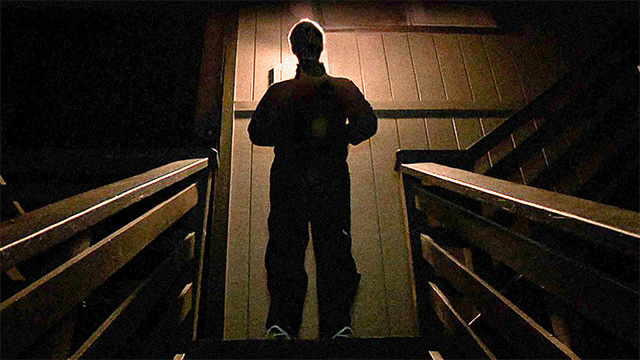Blumhouse Productions has become a horror powerhouse with its many popular and expansive titles, ranging from the ever-growing Paranormal Activity series to the endless sequel potential of the dystopian thriller The Purge. Fortunately, the company’s ambitions lie beyond becoming a tireless franchise machine, as evidenced by Creep, a minor curiosity that melds Blumhouse’s penchant for found footage with a free-wheeling indie spirit.
From the get-go, Creep feels like the product of two best pals who set out into the woods for a weekend of off-the-cuff filmmaking. The two best pals are director-writer-star Patrick Brice and his co-writer and co-star Mark Duplass, both of whom play the only characters in an eerily insular universe. Save for a voice heard over a cell phone, Brice and Duplass occupy a world devoid of fellow diners (as in a tense scene where they converse in a restaurant booth), neighbors, or general passerbys. Instead of looking cheap, the microcosmic effect allows the viewer to stay riveted to the two men as their bizarre interactions unfold.
The film opens on Aaron (Brice), a trusting soul en route to an anonymous, well-paying videography gig straight from Craigslist. When he arrives at his destination, a remote mountain cabin, he meets his benefactor, Josef, an overly friendly eccentric. After gushing over the Michael Keaton drama My Life, Josef explains that he has a terminal, inoperable brain tumor and wants to make a video diary for his unborn son. Though clearly freaked out, Aaron agrees to take the job, only to endure morbidly cryptic questions, drunken confessions, and kidnapping. Even after Aaron escapes, his torment continues when Josef becomes his ever-vigilant stalker.

Outfitted with a single camera, some naturalistic dialogue, and a few central props – including a foreboding ax and an unsettling rubber wolf mask – Brice and Duplass are able to create a dark horror comedy replete with playful energy. Much of the credit goes to Duplass, who, with his manic smile and hyper-focused gaze, sells his character’s craziness during a number of extended, uncut scenes. His performance adds an extra discomforting layer to a number of awkward setups – for example, an early moment in which Aaron must film Josef taking a bath reaches heights of unhinged lunacy when Josef pretends to engage in “tubby time” with his future child. It’s a wonder that Brice, who, from behind the camera, performs well as Duplass’ skittish straight man, was able to stifle his laughter during the many long takes.
As if Josef’s insanity wasn’t already plain, Brice employs a number of visual cues that push viewers toward that obvious conclusion. At one point, Josef’s childlike verve clashes with the sinister, shadowy image of him silhouetted by the harsh glow of a porch light. When Aaron finally confronts Josef, the camera tilts and sustains a canted angle that communicates, in a most conventional way, Josef’s mental state. These few instances at least provide some much-needed variety to the usual static shots and shaky cam sequences inherent to found footage.
Though lean in running time, scale, and budget, Creep demonstrates its makers’ masterful resourcefulness and spirited direction. Brisk, fun, and delightfully disturbed, the loony little cat-and-mouse game makes an entertaining trifle for anyone with a sick sense of humor. That it also serves as Brice’s feature debut should give viewers a reason to watch out for his next project.
Creep is now screening at Fantasia Film Festival.

